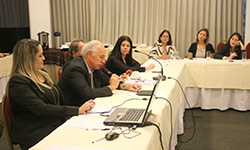At an April 10 roundtable in Hanoi, Vietnam, speakers gathered to discuss “Overlapping Protection of 3D Marks: Industrial Design and Copyrights.” Bross & Partners hosted the event, with Mr. Le Quang Vinh as moderator. Mr. Vinh kicked off the discussion with a presentation on the landscape for resolving disputes involving overlapping IP rights in Vietnam.
 Issues surrounding the authorization and determination of trademark rights under China’s new Trademark Law were the subject of a roundtable discussion hosted by Unitalen Attorneys at Law in Beijing on April 18. Among other topics, speakers shared their opinions about what the Supreme People’s Court’s legal interpretation on jurisdiction of trademark cases will be after the amended trademark law takes effect. Participants included a judge of the Supreme People’s Court, Unitalen attorneys and representatives of more than six IP agencies and law firms.Berkemeyer Attorneys & Counselors held a roundtable on the topic of ambush marketing on April 30 in Asunción, Paraguay. Twenty-seven attendees discussed examples of ambush marketing cases and agreed that balanced legislation is an important tool in helping to curb abuse of trademarks during major sporting events. Speakers included representatives of four member firms and Juan García, General Director of Paraguay’s National Trademark Office.
Issues surrounding the authorization and determination of trademark rights under China’s new Trademark Law were the subject of a roundtable discussion hosted by Unitalen Attorneys at Law in Beijing on April 18. Among other topics, speakers shared their opinions about what the Supreme People’s Court’s legal interpretation on jurisdiction of trademark cases will be after the amended trademark law takes effect. Participants included a judge of the Supreme People’s Court, Unitalen attorneys and representatives of more than six IP agencies and law firms.Berkemeyer Attorneys & Counselors held a roundtable on the topic of ambush marketing on April 30 in Asunción, Paraguay. Twenty-seven attendees discussed examples of ambush marketing cases and agreed that balanced legislation is an important tool in helping to curb abuse of trademarks during major sporting events. Speakers included representatives of four member firms and Juan García, General Director of Paraguay’s National Trademark Office.
At an April 10 roundtable in Hanoi, Vietnam, speakers gathered to discuss “Overlapping Protection of 3D Marks: Industrial Design and Copyrights.” Bross & Partners hosted the event, with Le Quang Vinh as moderator. Mr. Vinh kicked off the discussion with a presentation on the landscape for resolving disputes involving overlapping IP rights in Vietnam. The courts seem to be at a standstill with respect to resolving such cases, mainly because of a lack of adequate substantive law governing the topic. The speakers, who included representatives of academia, the Industrial Designs Department (NOIP) and the Copyright Office of Vietnam, all agreed that researching and amending the substantive law on protections for different types of IP were crucial in resolving these issues.
 Representatives of INTA member firms and nonprofit organizations teamed up in Singapore with the IP Academy of Singapore for a roundtable titled “Marking for a Cause” on April 4. As host, the IP Academy welcomed 34 attendees in order to raise awareness about the importance of trademarks for nonprofit organizations and how an INTA membership can support nonprofits’ IP needs. The event included an introduction to copyrights, trademarks and patents. Speakers also covered ways to commercialize trademarks and gave examples of acts that constitute trademark infringement, including potential consequences of such acts, pitfalls in enforcement and a recommended approach to enforcing IP rights for nonprofit organizations. Corinne Fong, Executive Director of the Society for the Prevention of Cruelty to Animals (SPCA), provided SPCA’s experiences with trademark infringement, highlighting the need for nonprofit organizations to take appropriate steps to protect their intellectual property.
Representatives of INTA member firms and nonprofit organizations teamed up in Singapore with the IP Academy of Singapore for a roundtable titled “Marking for a Cause” on April 4. As host, the IP Academy welcomed 34 attendees in order to raise awareness about the importance of trademarks for nonprofit organizations and how an INTA membership can support nonprofits’ IP needs. The event included an introduction to copyrights, trademarks and patents. Speakers also covered ways to commercialize trademarks and gave examples of acts that constitute trademark infringement, including potential consequences of such acts, pitfalls in enforcement and a recommended approach to enforcing IP rights for nonprofit organizations. Corinne Fong, Executive Director of the Society for the Prevention of Cruelty to Animals (SPCA), provided SPCA’s experiences with trademark infringement, highlighting the need for nonprofit organizations to take appropriate steps to protect their intellectual property.
 On May 28, host firm Alessandri Attorneys at Law invited 25 participants from INTA member firms, food industry representatives, authorities from the Chilean Instituto Nacional de Propriedad Industrial (INAPI) and the Ministry of Health to Santiago to discuss Chile’s new health regulations restricting the advertising of foods and their impact on trademark rights. Guest speakers included Dra. Lorena Rodriguez, Head of the Nutrition and Food Department of the Ministry of Health, and Dra. Roxana Buscaglione, Counselor of the Nutrition and Food Department of the Ministry of Health. The heads of three divisions of INPI also actively participated—Carolina Belmar, Sergio Escudero and Carmen Paz Alvarez. Rodrigo Velasco S., partner and IP Director at Alessandri, chaired the event.
On May 28, host firm Alessandri Attorneys at Law invited 25 participants from INTA member firms, food industry representatives, authorities from the Chilean Instituto Nacional de Propriedad Industrial (INAPI) and the Ministry of Health to Santiago to discuss Chile’s new health regulations restricting the advertising of foods and their impact on trademark rights. Guest speakers included Dra. Lorena Rodriguez, Head of the Nutrition and Food Department of the Ministry of Health, and Dra. Roxana Buscaglione, Counselor of the Nutrition and Food Department of the Ministry of Health. The heads of three divisions of INPI also actively participated—Carolina Belmar, Sergio Escudero and Carmen Paz Alvarez. Rodrigo Velasco S., partner and IP Director at Alessandri, chaired the event.
Moderated by Alessandri partner Loreto Bresky, the speakers discussed the new provisions on nutritional composition of foods and their advertising, which modify the Food Sanitary Code and include new advertising restrictions on foods with high calorie, fat, sugar, salt and other content. Going forward, advertising and packaging for these foods will have to include mandatory language warning consumers that they are high in such content. These provisions will therefore seriously affect trademark rights. However, the representatives of the health authorities who were present announced that these new regulations are still being reviewed, and that the government has decided to postpone their effective date until next year.
"This article first appeared in International Trademark Association magazine issue Vol 69 – No. 11 dated June 15, 2014. To view the issue in full, please go to http://www.inta.org”




